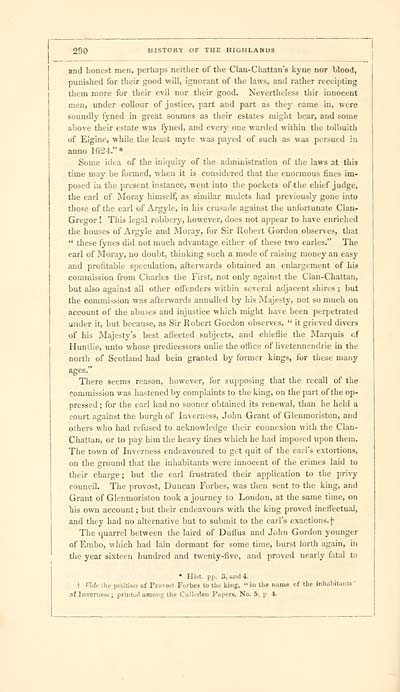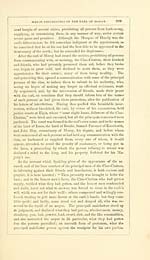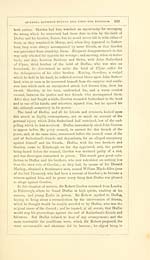Download files
Complete book:
Individual page:
Thumbnail gallery: Grid view | List view

290 HISTORTC Of THE HIGHLANDS
and honest men, perhaps neither of the Clan-Chattan's kyne nor blood,
punished for their good will, ignorant of the laws, and rather receipting
them more for their evil nor tlieir good. Nevertheless thir innocent
men, under collour of justice, part and part as they came in, were
soundly fyned in great soumes as their estates might bear, and some
above their estate was fyned, and ever3' one warded within tlie tolhuith
of Elgine, while the least myte was payed of such as was persued ;n
anno 1G24."*
Some idea of the iniquity of t!ie administration of tlie laws at this
time may be formed, when it is considered that the enormous fines im-
posed in the present instance, went into the pockets of the chief judge,
the earl of jNIoray himself, as similar mulcts had previously gone into
those of the earl of Argyle, in his crusade against tlie unfortunate Clan-
Gregor I This legal robbery, however, does not appear to have enriched
the houses of Argyle and Moray, for Sir Robert Gordon observes, that
" these fynes did not much advantage either of these two earles." The
earl of Moray, no doubt, thinking such a mode of raising money an easy
and profitable speculation, afterwards obtained an enlargement of his
commission from Charles the First, not only against the Clan-Chattan,
but also against all other offenders v.'ithin several adjacent shires ; but
the commission was afterwards annulled by his Majesty, not so much on
account of the abuses and injustice which might have been perpetrated
under it, but because, as Sir Robert Gordon observes, " it grieved divers
of his Majesty's best affected subjects, and chiefiie the Marquis cf
Huntlie, unto whose predicessors onlie the office of livetennendrie in the
north of Scotland had bein granted by former kings, for these many
ages."
There seems reason, however, for supposing that the recall of the
commission was hastened by complaints to the king, on the part of the op-
pressed ; for the earl had no sooner obtained its renewal, than he held a
court against the burgh of Inv erness, John Grant of Glenmoriston, and
others who had refused to acknowledge their connexion with the Clan-
Chattan, or to pay him the heavy fines which he had imposed upon them.
The town of Inverness endeavoured to get quit of the earl's extortions,
on the ground that the inhabitants were innocent of the crimes laid to
their charge ; but the earl frustrated their application to the privy
council. The provost, Duncan Forbes, was then sent to the king, and
Grant of Glenmoriston took a journey to London, at the same time, on
his own account ; but their endeavours with the king proved ineffectual,
and they had no alternative but to submit to the earl's exactions.f
The quarrel between the laird of Duflus and John Gordon younger
of Erabo, which had lain dormant for some time, burst forth again, in
the year sixteen hundred and twenty-five, and proved nearly fatal to
* Hisl. pp. 3, ;iiicl4.
+ Vide, ihe petition of Provost Forbes to tlic king, " in llie n.i
of Inverness ; priiitud among the Culloden Papers, No. 5. p 4.
of Ihe inh.ibil.int.'i '
and honest men, perhaps neither of the Clan-Chattan's kyne nor blood,
punished for their good will, ignorant of the laws, and rather receipting
them more for their evil nor tlieir good. Nevertheless thir innocent
men, under collour of justice, part and part as they came in, were
soundly fyned in great soumes as their estates might bear, and some
above their estate was fyned, and ever3' one warded within tlie tolhuith
of Elgine, while the least myte was payed of such as was persued ;n
anno 1G24."*
Some idea of the iniquity of t!ie administration of tlie laws at this
time may be formed, when it is considered that the enormous fines im-
posed in the present instance, went into the pockets of the chief judge,
the earl of jNIoray himself, as similar mulcts had previously gone into
those of the earl of Argyle, in his crusade against tlie unfortunate Clan-
Gregor I This legal robbery, however, does not appear to have enriched
the houses of Argyle and Moray, for Sir Robert Gordon observes, that
" these fynes did not much advantage either of these two earles." The
earl of Moray, no doubt, thinking such a mode of raising money an easy
and profitable speculation, afterwards obtained an enlargement of his
commission from Charles the First, not only against the Clan-Chattan,
but also against all other offenders v.'ithin several adjacent shires ; but
the commission was afterwards annulled by his Majesty, not so much on
account of the abuses and injustice which might have been perpetrated
under it, but because, as Sir Robert Gordon observes, " it grieved divers
of his Majesty's best affected subjects, and chiefiie the Marquis cf
Huntlie, unto whose predicessors onlie the office of livetennendrie in the
north of Scotland had bein granted by former kings, for these many
ages."
There seems reason, however, for supposing that the recall of the
commission was hastened by complaints to the king, on the part of the op-
pressed ; for the earl had no sooner obtained its renewal, than he held a
court against the burgh of Inv erness, John Grant of Glenmoriston, and
others who had refused to acknowledge their connexion with the Clan-
Chattan, or to pay him the heavy fines which he had imposed upon them.
The town of Inverness endeavoured to get quit of the earl's extortions,
on the ground that the inhabitants were innocent of the crimes laid to
their charge ; but the earl frustrated their application to the privy
council. The provost, Duncan Forbes, was then sent to the king, and
Grant of Glenmoriston took a journey to London, at the same time, on
his own account ; but their endeavours with the king proved ineffectual,
and they had no alternative but to submit to the earl's exactions.f
The quarrel between the laird of Duflus and John Gordon younger
of Erabo, which had lain dormant for some time, burst forth again, in
the year sixteen hundred and twenty-five, and proved nearly fatal to
* Hisl. pp. 3, ;iiicl4.
+ Vide, ihe petition of Provost Forbes to tlic king, " in llie n.i
of Inverness ; priiitud among the Culloden Papers, No. 5. p 4.
of Ihe inh.ibil.int.'i '
Set display mode to: Large image | Transcription
Images and transcriptions on this page, including medium image downloads, may be used under the Creative Commons Attribution 4.0 International Licence unless otherwise stated. ![]()
| Early Gaelic Book Collections > Ossian Collection > History of the Highlands and of the Highland clans > Volume 1 > (404) |
|---|
| Permanent URL | https://digital.nls.uk/79677445 |
|---|
| Description | Vol. I. |
|---|---|
| Shelfmark | Oss.247 |
| Additional NLS resources: | |
| Attribution and copyright: |
|
| Description | Selected books from the Ossian Collection of 327 volumes, originally assembled by J. Norman Methven of Perth. Different editions and translations of James MacPherson's epic poem 'Ossian', some with a map of the 'Kingdom of Connor'. Also secondary material relating to Ossianic poetry and the Ossian controversy. |
|---|
| Description | Selected items from five 'Special and Named Printed Collections'. Includes books in Gaelic and other Celtic languages, works about the Gaels, their languages, literature, culture and history. |
|---|

